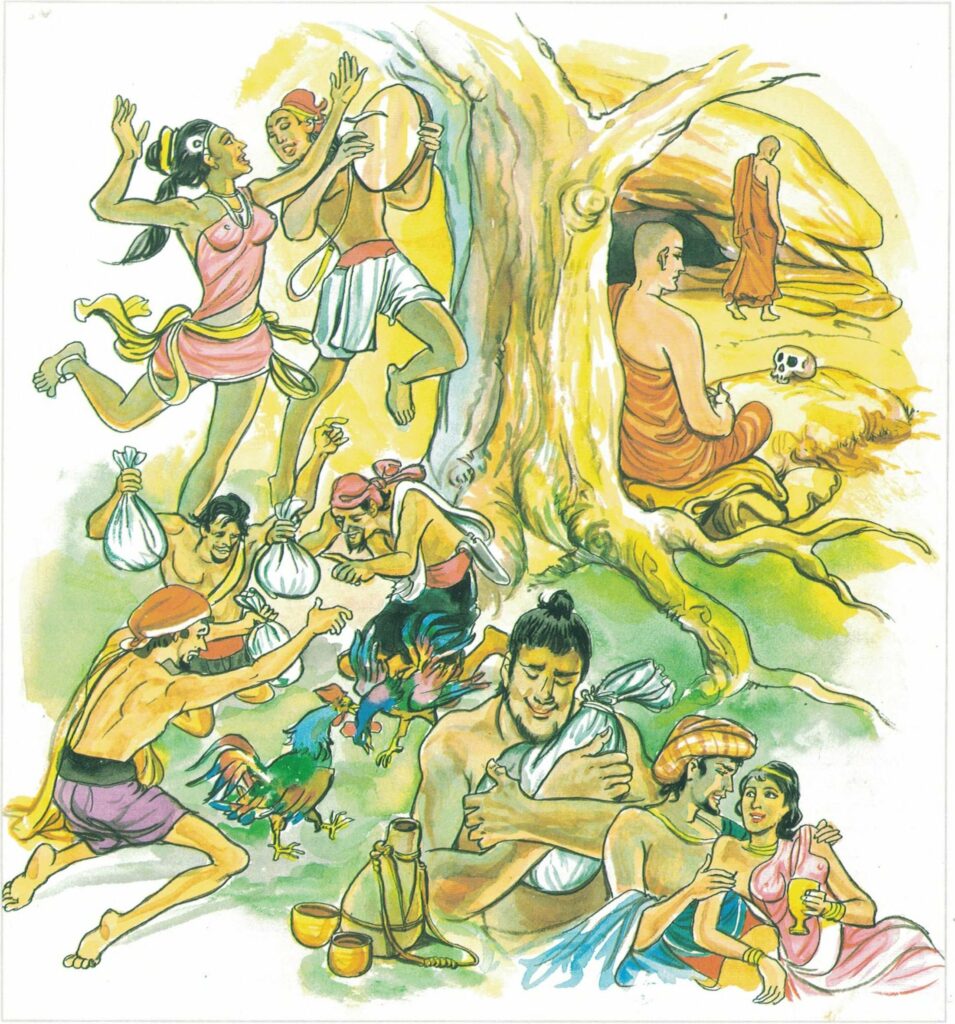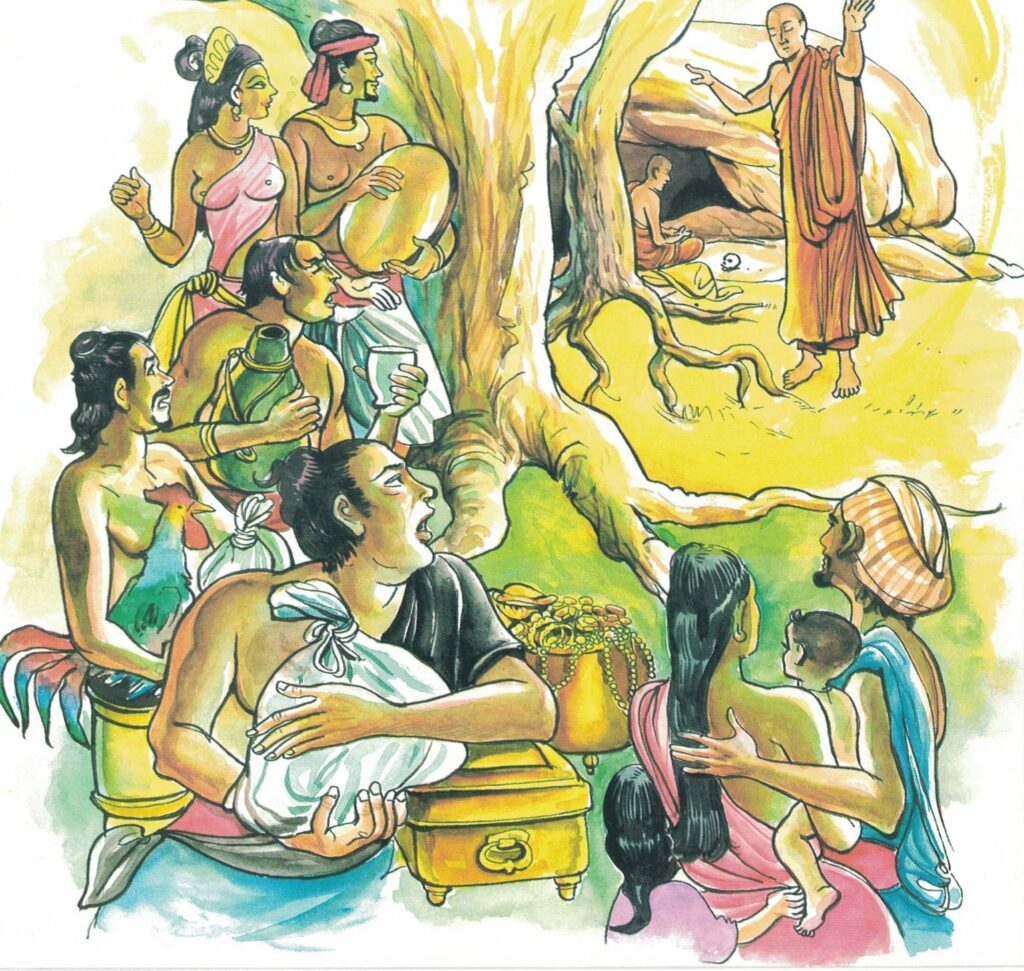Pali text, illustration and English translation of Dhammapada verse 26-27:
pamādamanuyuñjanti bālā dummedhino janā |
appamādañca medhāvi dhanaṃ seṭṭhaṃ’va rakkhati || 26 ||
mā pamādamanuyuñjetha mā kāmarati santhavaṃ |
appamatto hi jhāyanto pappoti vipulaṃ sukhaṃ || 27 ||
26. Foolish folk of little wit in heedlessness indulge, the one who’s wise guards heedfulness kin to the greatest wealth.
27. Don’t indulge in heedlessness! Don’t come near to sexual joys! The heedful and contemplative attains abundant bliss.


The Story of Bāla Nakkhatta Festival
While residing at the Jetavana Monastery, the Buddha spoke these verses, in connection with the Bāla Nakkhatta festival–the festival of simpletons.
On a certain date there was a simpletons’ festival celebrated in Sāvatthi, and on the occasion of this foolish holiday, folk used to smear their bodies with ashes and cow-dung and for a period of seven days go about uttering all manner of coarse talk.
At this time people showed no respect for kinsfolk or friends or monks when they met them, but stood in the doorways and insulted them with coarse talk. Those who could not endure the coarse talk would pay the holiday-makers a half or a quarter or a penny, according to their means, and the holiday-makers would take the money and depart from their houses.
Now at this time there were in Sāvatthi five million Noble Disciples, and they sent word to the teacher, “Venerable, let the Buddha refrain for a period of seven days from entering the city with the congregation of monks; let him instead remain at the monastery.” And, for a period of seven days the noble disciples caused food to be prepared for the congregation of monks at the monastery and sent it to them, but did not themselves leave their houses.
On the eighth day, however, when the festival was at an end, they invited the congregation of monks to be their guests, escorted them into the city, and gave abundant offerings. And having seated themselves respectfully on one side, they said to the Buddha, “Venerable, we have spent the past seven days unpleasantly. Our ears were about to burst from hearing the coarse talk of foolish folk. No one showed any respect for anybody else, and for this reason we did not permit you to enter the city. We ourselves did not go out of the house.”
The Buddha listened to what they said, and then replied, “In this manner unintelligent men conduct themselves. But they who are intelligent preserve heedfulness as their greatest treasure, and by so doing at last attain the attainment of the great Nibbāna.”
Explanatory Translation (Verse 26)
bālā dummedhino janā pamādaṃ anuyuñjanti
medhāvī ca appamādaṃ seṭṭhaṃ dhanaṃ iva rakkhati
bālā: those unaware of real values; dummedhino janā: foolish people;pamādaṃ anuyuñjanti: indulge in unmindfulness; medhāvi ca: as for wise men; appamādaṃ [appamāda]: mindfulness; seṭṭhaṃ dhanaṃ iva: like a great treasure; rakkhati: cherish.
Those who are foolish and indiscriminating indulge in heedlessness. But the wise cherish mindfulness as a great treasure. The foolish people live a life of sensual pleasure. They indulge in pursuits that are not at all conducive to spiritual advancement. To obtain worldly acquisitions, people need wealth. In the same way, to obtain high spiritual acquisitions we need some wealth, and that wealth is mindfulness.
Commentary and exegetical material (Verse 26)
bālā: this is a categorization that occurs in most areas of Buddha’s teachings. The person referred to by this expression is generally thought of as an ignorant person, or as a foolish individual. But it does not mean that such a person is not adept in arts and crafts. What is meant is that the person so referred to is not sufficiently alert to reality–he is not capable of understanding the true nature of things. Such an individual’s behaviour is, at times, considered childish or immature, in terms of spiritual evolution. He is given to excessive self-indulgence and to the pursuit of sensual pleasures. He does not strive to become righteous, virtuous or to lead a life of good conduct. He does not know what is beneficial to him for this world and for the next. In modern psychological jargon, it means “an emotionally immature person”.
pamādaṃ anuyuñjanti: The term “pamāda” literally means the “basic insanity” that all unenlightened people suffer from. It is being carried away by emotions and losing awareness of reality. It is lack of emotional control. It is the same thing as emotional immaturity. It may be also called “neurosis”. We translate it here as mindlessness or unmindfulness as opposed to mindfulness.
seṭṭhaṃ dhanaṃ iva: The expression concerns the mindful. They protect their mindfulness as one would protect a great treasure. Those people who are sensuous, think in terms of wealth as a means of enjoying worldly pleasures. Therefore, to them worldly wealth is the only treasure that matters. In the old commentaries, worldly treasures are considered to be seven in number. They are gold, silver, pearls, gems, lapis lazuli, conch and the shila gem. But to the truth-seekers the treasures are mindfulness and steadfastness. These ensure the means of obtaining the highest Fruits of Spiritual Realization.
Explanatory Translation (Verse 27)
pamādaṃ mā anuyuñjetha kāmaratisanthavaṃ
mā (anuyuñjetha) appamatto hi jhāyanto vipulaṃ sukhaṃ pappoti
pamādaṃ [pamāda]: heedlessness; mā: do not; anuyuñjetha: indulge in; kāmaratisanthavaṃ [kāmaratisanthava]: sensual pleasures; mā: avoid; appamatto hi: the mindful person; jhāyanto [jhāyanta]: meditatively engaged; vipulaṃ sukhaṃ [sukha]: high-bliss; pappoti: reaches.
Do not indulge in heedlessness. Avoid craving for sensual pleasures, whatever their nature. The mindful person is tranquil in mind. He will attain the great bliss.
Commentary and exegetical material (Verse 26)
kāmarati santhavaṃ: the expression implies indulgence in sensual pleasures. The stanza stresses the fact that such indulgence leads to the relaxation of mindfulness and the flagging of enthusiasm for truth-seeking. The implication here is that one should not give in to attachments, whatever their nature. Therefore, the main emphasis is on the need to avoid tanhā which is literally translated as “thirst”. It is this “thirst”, desire, greed, craving, manifesting itself in various ways, that gives rise to all forms of suffering and the continuity of being (bhava). But it should not be taken as the first cause, for there is no first cause possible, according to Buddhism, because everything must have a cause. So “thirst” is not the first or the only condition for the arising of sorrow. But it is an essential condition for the arising of sorrow. The term “thirst” includes not only desire for, and attachment to, sensepleasures, wealth and power, but also desire for, and attachment to, ideas and ideals, views, opinions, theories, conceptions and beliefs. According to the Buddha’s analysis, all the troubles and strife in the world, from little personal quarrels in families to great wars between nations and countries, arise out of this “thirst”, from this point of view, all economic, political and social problems are rooted in this selfish ‘thirst’. Great statesmen who try to settle international disputes and talk of war and peace only in economic and political terms touch the superficialities, and never go deep into the real root of the problem. As the Buddha told Raṭṭapāla: “The world lacks and hankers, and is enslaved to ‘thirst’.”
Kāmarati can also be described as the sensual urge. In modern language, it may be called “the impulsive urge.” The Buddha said, “What, O monk, is the origin of suffering? It is that craving which gives rise to ever fresh rebirth and, bound up with pleasure and lust, now here, now there, finds ever fresh delight.” The sensual urge is accompanied by the urge for existence or the urge for non-existence. Of this urge or Craving for Existence it is said: “No first beginning of the Craving for Existence can be perceived, O monks, before which it was not and after which it came to be. But it can be perceived that Craving for Existence has its specific condition. I say, O monks, that also Craving for Existence has its conditions that feed it and are not without it. And what is it? ‘Ignorance’, one has to reply—Craving for Existences and Ignorance are called “the outstanding causes that lead to happy and unhappy destinies (courses of existence).”
Kāmacchanda means sensual desires or attachment to pleasurable sense-objects such as form, sound, odour, taste, and contact. This, too, is regarded as one of the fetters that bind one to Saṃsāra. An average person is bound to get tempted by these alluring objects of sense. Lack of self-control results in the inevitable arising of passions. This Hindrance is inhibited by One-pointedness, which is one of the five characteristics of Jhānas. it is attenuated on attaining Sakadāgāmi and is completely eradicated on attaining Anāgāmi. Subtle forms of attachment such as Rūpa Rāga and Arūpa Rāga (Attachment to Realms of Form and Formless Realms) are eradicated only on attaining Arahatship.
The following six conditions tend to the eradication of sense-desires.
- perceiving the loathsomeness of the object,
- constant meditation on loathsomeness,
- sense-restraint,
- moderation in food,
- good friendship, and
- profitable talk.
Another comment is as follows:
Dependent on feeling arises craving which, like ignorance, is the other most important factor in the “Dependent origination.” Attachment, thirst and clinging are some renderings for this Pāli term. This is an aspect of the 2nd Noble Truth–Craving is threefold–namely, craving for sensual pleasures, craving for sensual pleasures associated with the view of eternalism, i.e., enjoying pleasures thinking that they are imperishable, and craving for sensual pleasures with the view of nihilism i.e., enjoying pleasures thinking that everything perishes after death. The last is the materialistic standpoint. These are also interpreted as attachment to Realms of Form and Formless Realms respectively. Usually these two terms are rendered by craving for existence and non-existence. There are six kinds of craving corresponding to the six sense objects such as form, sound and so on. They become twelve when they are treated as internal and external. They are reckoned as thirty-six when viewed as past, present and future. When multiplied by the foregoing three kinds of craving, they amount to one hundred and eight. It is natural for a worldling to develop a craving for the pleasures of sense. To overcome sense-desires is extremely difficult. The most powerful factors in the wheel of life are ignorance and craving, the two main causes of the Dependent Origination. Ignorance is shown as the past cause that conditions the present; and craving, the present cause that conditions the future. Dependent on craving is grasping which is intense craving. Craving is like groping in the dark to steal an object. Grasping corresponds to the actual stealing of the object. Grasping is caused by both attachment and error. It gives rise to the false notions, of “I” and “mine”. Grasping is four-fold–namely, Sensuality, False Views, Adherence to rites and ceremonies, and the Theory of a soul.
mā pamādaṃ anuyuñjetha: this is an admonition to those who quest for truth. If they want to succeed in reaching their goal they must never relax their mindfulness. They must not engage in activities that are likely to bring about worldliness and are likely to emphasize worldly pleasures. The non-engagement in mindfulness is a bar to proper meditation.